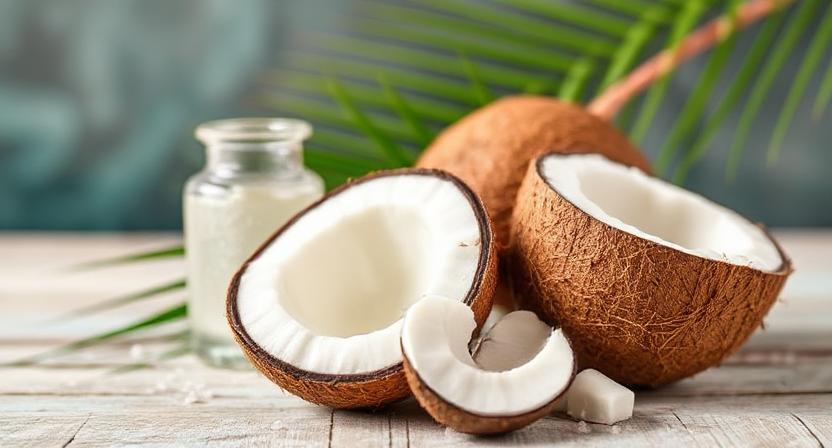Discover how coconut oil can be your secret weapon against wrinkles and dull skin. Learn the 5 science-backed ways it boosts skin health naturally!
Aging is a natural part of life that we can all expect to experience. However, wrinkles that come too early in life aren’t inevitable and can be helped by a product that is natural, inexpensive, and effective. That product is coconut oil. Coconut oil is a tropical oil from the coconut meat and has been used in skin-care routines in various cultures for centuries, and for good reason.
In this article, we will discuss 5 proven ways coconut oil helps reduce wrinkles and improve skin health, as backed by both traditional practices and science. Plus, tips will be given on how to use the product safely and effectively in your skin routine.
Why Is Coconut Oil an Excellent Skin-Care Product
Coconut oil is extracted from the meat of mature coconuts, and it is high in good fats, antioxidants, and antimicrobial agents. As demonstrated above, coconut oil’s unique composition makes it a useful natural remedy for various skin ailments, specifically fine lines and sagging skin, and dullness.
Here are its most skin-friendly ingredients in a nutshell;
Lauric Acid: antibacterial and anti-inflammatory properties.
Caprylic and Capric Acids: moisturizing properties and strengthen the protective skin barrier.
Vitamin E: a powerful antioxidant that neutralizes free radicals.
Polyphenols and Phytosterols: improve elasticity and offer that youthful glow.
Let’s talk about how coconut oil does wonders for aging skin, now!
1. It penetrates into the skin and Moisturizes and Plumps

One of the biggest contributors to wrinkle formation is dry skin. When the skin is dry, it loses elasticity, and flaky skin can add to a wrinkled appearance. Coconut oil is a natural emollient to lock in moisture and create a layer of protection to keep the skin hydrated and supple.
How it works:
Compared to most commercial moisturizers, coconut oil penetrates the skin at a deeper level because of its small molecular size and lipid structure. When coconut oil penetrates the skin, it hydrates the epidermis (the outer layer of skin) so that it is more hydrated, giving the skin a smoother appearance more youthful appearance. With long-term use, skin that has been dehydrated and has fine lines from that dehydration will begin to reduce in appearance.
Supporting evidence:
The International Journal of Molecular Sciences published a study that concluded virgin coconut oil was efficacious at improving hydration and lipid barrier function in the skin, as well as reducing transepidermal water loss and skin softening.
How to use it:
After cleansing your face, whilst your skin is still damp, apply some coconut oil to your skin and massage in gently before bed. If your skin has dry areas (under the eyes, around the mouth, and neck), these are always good areas to focus on and apply extra oil.
Bonus Tip!!
Use the coconut oil as an overnight mask 2-3 times a week for extra hydration!
2. Neutralizes Free Radicals with Strong Antioxidants
Free radicals are unstable molecules caused by pollution, UV rays, and stress. They harm collagen and elastin, causing wrinkles and skin aging. Antioxidants are your first line of defense, and coconut oil is loaded with them.
How it Works:
Vitamin E in coconut oil combats oxidative stress.
It contributes to sustaining the collagen structure of your skin, which promotes firmness and elasticity.
Antioxidants slow skin aging by minimizing the damage done by environmental aggressors.
Evidence Supporting:
Research in the Journal of Dermatological Science suggests that when antioxidants are used topically, they can slow down visible signs of aging, including pigmentation and wrinkle formation.
How to Use:
Mix coconut oil with some drops of vitamin C or rosehip oil, and you have an amazing antioxidant-rich serum.
Apply it in your evening skincare routine.
3. Helps Boost Collagen Production and Skin Recovery
Skin collagen is the structural protein that makes skin hold its firmness and softness. As we age, the production of collagen slows and begins to sag, which leads to wrinkles. Coconut oil will help to stimulate collagen formation in the skin while also providing skin regeneration.
Process:
Coconut oil stimulates fibroblast production; fibroblasts are the cells that produce collagen and elastin. This enhances skin regeneration by helping the skin heal from micro-traumas, which improves skin texture and tone.
Evidence of Support:
A study of wound healing found that virgin coconut oil accelerated wound healing, mainly due to improved collagen production. While much more research needs to be done on the effects of wrinkles specifically, these studies suggest evidence of efficacy.
How to Implement:
Combine coconut oil with turmeric and/or honey into a weekly face mask to help foster skin regeneration. You can also use it regularly in areas known to produce fine lines, such as the forehead and under-eye region.
4. Calms Irritation and Inflammation
Chronic inflammation is an unsuspected cause of premature aging. It damages collagen, promotes redness, and causes dysfunction of the skin barrier. Coconut oil is great for irritated or inflamed skin because of its abundance of anti-inflammatory properties.
How It Works:
Coconut oil has both lauric acid and capric acid, which both have soothing properties.
It can help reduce redness, swelling, and irritation, and is especially useful for those who have sensitive skin or skin prone to acne.
Supporting Evidence:
A recent study in Pharmaceutical Biology shows that when examining the effect of coconut oil, researchers found a significant reduction in inflammatory markers as well as an improvement in the skin condition of dermatosis patients.
How to Use:
Coconut oil can be used after exposure to the sun in a small amount to help soothe the sunburn and inflammation.
Coconut oil can have an enhanced cool feeling when mixed with aloe vera gel.
Note: If you have sensitive or acne-prone skin, always do a patch test on coconut oil. Coconut oil can block pores in some people.
5. Protects the skin barrier and prevents premature aging
Your skin barrier is important for protecting your skin from pollutants, toxins, and drying out. If your skin barrier breaks down, it leads to dry, very sensitive skin and can also speed up the aging of your skin. Coconut oil provides a boost to repair the lipid skin barrier, making it more resilient.
How It Works: Acts as an emollient on the skin, preventing destruction of moisture.
Preventing TEWL (trans-epidermal water loss) is a big contributor to dull aging skin.
Strengthening the skin’s defenses against external stressors like weather and chemicals.
Supporting Evidence: The findings in the Dermatitis Journal showed coconut oil had a better clinical effect of improving skin barrier than mineral oil, due to the former’s high-fat content and antimicrobial properties.
How to Use: The Last step of your nighttime skincare routine to seal in other products.
Great for dry climates or winter months to prevent moisture loss.
Bonus: How to Choose the Best Coconut Oil for Your Skin:
There is variation in the quality of coconut oil. Thus, if you want to use it for your skin, quality is an important factor.
Look for:
– Cold-pressed,
– Unrefined or Virgin,
– Organic,
– Non-comedogenic label (if you are acne-prone).
Avoid refined or hydrogenated oils that do not have really good nutrients for your use and might just cause breakouts.
Common Myths About Coconut Oil and Wrinkles—Debunked
Myth 1: Coconut oil creates wrinkles long-term
Fact: No scientific research supports this claim. In fact, coconut oil can improve skin moisture, increase collagen, and fight free radicals—three things that can help reduce wrinkles.
Myth 2: Coconut oil is comedogenic and causes acne
Fact: Because the comedogenic rating of coconut oil is high, it could clog pores for individuals with oily, adult, or teenage acne-prone skin. Everyone’s skin is different, so you can try a patch test; if coconut oil breaks you out, you may want to use jojoba oil or rosehip oil instead.
The Right Candidates For Using Coconut Oil
Being dangerous under a few conditions, people need to consider contraindications.
Avoid if you have:
- Highly sensitive or oily skin
- Cystic acne
- Coconut allergies
Always patch test before full application.
Final Thoughts: Coconut Oil as a Natural Anti-Aging Hero
Coconut oil isn’t a magic potion, but the easiest means of natural protection against wrinkles and for skin health when applied properly.
To summarize, coconut oil:
Hydrates and plumps skin deeply
Free-radical neutralizer-antioxidants
Collagen boost and skin repair
Soothes inflammation
Strengthens skin barrier
Whether you’re developing an anti-aging routine or you’re simply wanting to streamline your skincare by using natural products, you should have coconut oil on your shelf.

FAQs
Q1: Can I use coconut oil on my face daily?
You can! Just make sure your skin can tolerate it. Start off by using 2-3 times a week and see how your skin reacts.
Q2: Does coconut oil reduce deep wrinkles?
Coconut oil can soften skin and decrease the appearance of fine lines and early wrinkles but you will want to user more intensive treatments like retinol or peptides for the appearance of deep-set wrinkles.
Q3: Is it safe to mix coconut oil with my essential oils?
Yes! For added anti-aging benefits, consider mixing coconut oil with frankincense, lavender, or rosehip oil.
Q4: Is coconut oil better than anti-aging creams?
It depends on what type of skin you have and your individual needs. While coconut oil is a fabulous natural option, some anti-aging creams have clinically proven ingredients like retinoids and hyaluronic acid.







